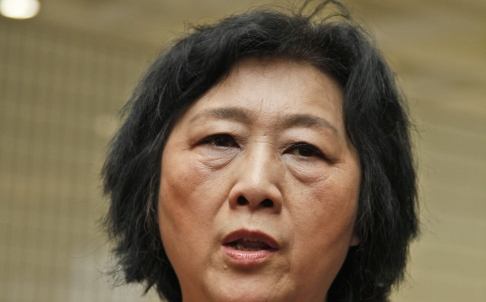Veteran Chinese journalist Gao Yu, who was detained almost a year ago and tried in November for leaking state secrets to foreigners, was sentenced to seven years in prison on Friday, South China Morning Post reports:
The Beijing No. 3 Intermediate Court handed down the judgment on Friday morning, according to a family source.
Gao, 71, originally stood trial in Beijing in November and denied the charge, often used to jail journalists in China.
Gao immediately said she wanted to appeal against the sentence.
She remained calm and was smiling as she said she planned to appeal, the source said.
[…] She was forced to make a confession on state television last May, but later told prosecutors it was extracted under coercion when threats were made against her son. [Source]
[See CDT’s further update on the case against Gao Yu here.]
Under Article 111 of China’s Criminal Law, the charge against Gao can carry a sentence of anything up to life imprisonment, depending on the gravity of the case. The verdict had been postponed twice, which according to lawyer Mo Shaoping speaking earlier this week meant that “the court couldn’t reach a verdict in the stipulated time.”
The state secrets in question are believed to include an internal Party memo called Document No. 9, whose existence was first reported in August 2013. The document listed “seven perils” facing Party rule: Western-style constitutional democracy, universal values, civil society, neoliberalism, Western-style journalism, and questioning the Party’s historical record and current direction. Bao Tong, aide to former premier Zhao Ziyang, told Radio Free Asia this week that revealing the document would have been no more than Gao’s duty:
“She got to hear about a story, that the party central office had a certain Document No. 9,” Bao told RFA on Thursday. “She told her readers what she had found out, which is the sacred duty of a journalist.”
[…] “The central office of the Chinese Communist Party should take responsibility here,” Bao said.
“The central committee produces a document in line with Marxism-Leninism and nationalism, which serves the people, so what is there in this document that they can’t let people see?”
[…] “If this document from the central committee is a good one, then shouldn’t it be put out there? And if it’s a bad one that will have deleterious effects on the country and people, then surely it is the job of a journalist to tell people about it,” Bao added. [Source]
On Twitter, Amnesty International’s Nicholas Bequelin outlined China’s capricious system of state secrets, which is also involved in the case against China’s former security chief Zhou Yongkang:
Here is what you need to know about what "state secrets" means in #China – ahead of Gao Yu's sentence today and Zhou Yongkang's trial:
— Nicholas Bequelin (@bequelin) April 17, 2015
1. The state secrets protection system is actually an information distribution system within the CPC and the Gvt: who gets what info.
— Nicholas Bequelin (@bequelin) April 17, 2015
2. The definition of what is a State secret is over-broad and open ended. There is no real way to legally challenge a classification.
— Nicholas Bequelin (@bequelin) April 17, 2015
3. Even publicly available information can be considered a state secret if communicated abroad, under the "intelligence" 情报 provisions.
— Nicholas Bequelin (@bequelin) April 17, 2015
4. Trials that involve state secrets are exempt from the requirement that all trials in China be open.
— Nicholas Bequelin (@bequelin) April 17, 2015
5. State secrets charges have long been the weapon of choice to silence critics, dissenters, journalists and party foe.
— Nicholas Bequelin (@bequelin) April 17, 2015
6. In short: the state secret system in #China is both an internal information distribution system and an omnipresent censorship system.
— Nicholas Bequelin (@bequelin) April 17, 2015
Ahead of Friday’s verdict, Human Rights Watch’s Maya Wang described Gao’s career and past incarcerations:
Gao’s journalistic career began in the 1980s at the government wire service, China News Service. She went on to become the vice editor of the liberal Economics Weekly, which was shut down for its instrumental role during the pro-democracy Tiananmen Square protests of 1989. For reporting on and supporting the protests, Gao was imprisoned from June 1989 to August 1990. She was imprisoned again from 1993 to 1999 on charges of “illegally provided state secrets abroad” – the same charge she currently faces.
[…] Between her last prison term and her current detention, Gao remained active in writing political commentaries, and is most recently known for her hard-hitting analytical pieces criticizing President Xi Jinping early in his tenure.
If Gao’s rigorous, critical reporting about vital government policies constitutes a threat to the state, it’s hard to see her prosecution as anything other than the latest effort by the Chinese leadership to silence virtually all debate. No ‘China dream’ can be realized until peaceful criticism is respected. [Source]
According to Bob Dietz of the Committee to Protect Journalists, Gao “is one of 44 journalists CPJ counted behind bars in China as of December 1, 2014, making the country the leading jailer of journalists. The figure marked the highest tally of journalists jailed there since CPJ began keeping records in 1990.”








